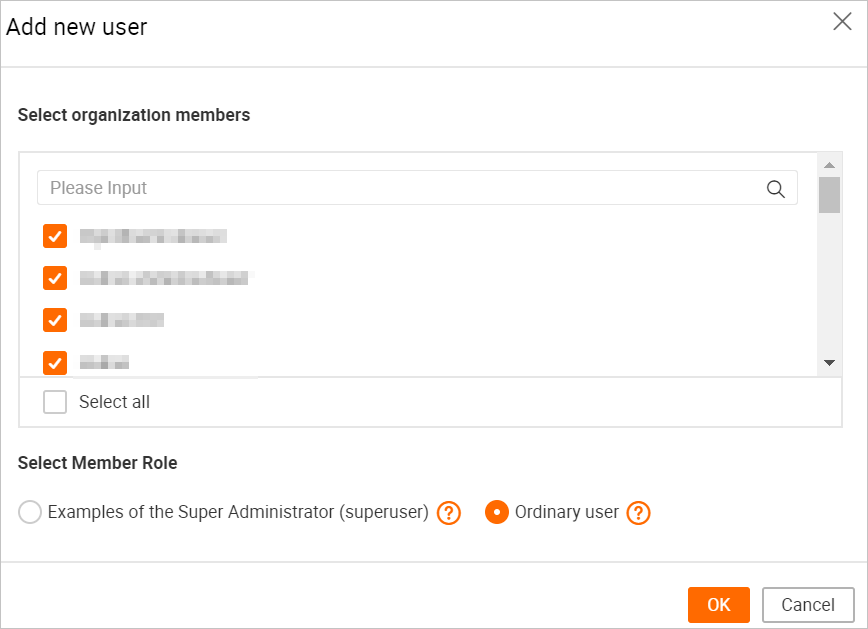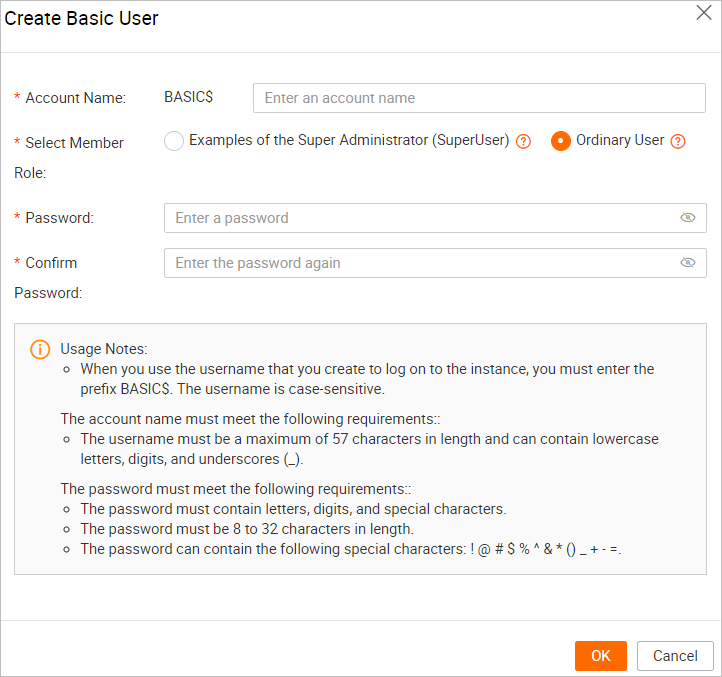Hologres コンソールのユーザー管理モジュールを使用して、ユーザーの追加、削除、および権限の付与を行うことができます。このモジュールは、インスタンス内のユーザーを詳細に管理するためのビジュアルインターフェイスを提供します。
インスタンスの購入に使用される Alibaba Cloud アカウントは、デフォルトのスーパー管理者 (Superuser) であり、そのインスタンスに対するすべての権限を持っています。他のユーザーを追加する前は、ユーザー管理ページには現在の Alibaba Cloud アカウントの情報のみが表示されます。次の表は、ユーザー管理ページの項目について説明しています。
項目 | 説明 |
|
メンバー |
現在のインスタンス内のユーザー名。これには、Alibaba Cloud アカウント、Resource Access Management (RAM) ユーザー、およびカスタムアカウントが含まれます。 |
|
Alibaba Cloud アカウント |
現在のインスタンス内のユーザーの Alibaba Cloud アカウント ID。 例:
|
|
アカウントタイプ |
現在のインスタンス内のユーザーのアカウントタイプ。
|
|
ロールタイプ |
現在のインスタンス内のユーザーの権限タイプ。
|
操作 |
対象メンバーのActions列で、Deleteをクリックして、ユーザーをインスタンスから削除します。削除後、ユーザーはそのインスタンスに対するアクセス権限を失います。 |
制限
デフォルトでは、カスタムアカウントは MaxCompute 外部テーブルをクエリできません。この機能を有効にするには、USER MAPPING を設定する必要があります。詳細については、「よくある質問」をご参照ください。
ユーザーを追加する
ユーザー管理ページでインスタンスにユーザーを追加できます。
-
[Users] ページで、対象インスタンス名を選択し、右上隅の [Add User] をクリックします。
-
Add User ダイアログボックスで、現在の Alibaba Cloud アカウントに関連付けられている既存の RAM ユーザーを選択し、次にユーザータイプとして [スーパーユーザー] または Normal User を選択します。
 説明
説明-
現在の Alibaba Cloud アカウントに RAM ユーザーがない場合は、まず作成する必要があります。詳細については、「RAM ユーザー権限付与のクイックスタート」をご参照ください。
-
Alibaba Cloud アカウントまたは Superuser として設定された RAM ユーザーを使用している場合は、ユーザーを追加できます。RAM ユーザーには AliyunRAMReadOnlyAccess 権限が付与されている必要があります。詳細については、「RAM ユーザーへの権限付与」をご参照ください。
-
Superuser: Superuser はインスタンスに対するすべての権限を持っています。RAM ユーザーに Superuser 権限を付与した場合、他の権限付与は不要です。
-
Normal User: Normal User はインスタンス内にのみ作成され、データベース、スキーマ、テーブルなどのオブジェクトを表示または操作する権限を持っていません。ユーザーがインスタンスを表示または操作できるようにするには、Normal User に権限を付与する必要があります。
視覚的インターフェイスを使用して権限を付与するには、[DB 管理] ページに移動できます。SQL 文を使用して権限を付与することもできます。詳細については、「RAM ユーザーの権限付与クイックスタート」をご参照ください。
-
ユーザーを削除する
Users ページで、対象のインスタンス名を選択します。ユーザーリストで、削除するユーザーを見つけ、Actions 列の Delete をクリックします。この操作により、ユーザーはインスタンスから削除され、すべてのアクセス権限が取り消されます。
カスタムユーザーの作成
カスタムユーザーは Hologres 内でのみ有効です。カスタムユーザーが MaxCompute 外部テーブルなどの他の Alibaba Cloud プロダクトにアクセスできるようにするには、User Mapping を使用してユーザーのアカウントをアタッチする必要があります。詳細については、「よくある質問」をご参照ください。
コンソール操作
ユーザー管理ページでインスタンスのカスタムユーザーを作成できます。
-
[Users] ページで、対象インスタンス名を選択し、右上隅の [Create Custom User] をクリックします。
-
Create Custom User ダイアログボックスで、次のパラメーターを設定します。

パラメーター
説明
カスタムアカウント
カスタムアカウント名を入力します。名前は最大 57 文字で、小文字、数字、アンダースコア (_) のみを含めることができます。
メンバーロールの選択
ユーザータイプを選択します。
-
Superuser: インスタンスに対するすべての権限を持っています。RAM ユーザーに Superuser 権限が付与されている場合、他の権限付与は不要です。
-
Normal User: インスタンス内にのみ作成され、データベース、スキーマ、テーブルなどのオブジェクトを表示または操作する権限を持っていません。ユーザーがインスタンスを表示または操作できるようにするには、Normal User に権限を付与する必要があります。
パスワード
次の要件を満たすパスワードを設定します。
-
大文字、小文字、数字、特殊文字のうち、少なくとも 3 種類を含める必要があります。
-
長さは 8 ~ 32 文字である必要があります。
-
サポートされている特殊文字には、
!@#$%^&*()_+-=が含まれます。
パスワードの確認
パスワードをもう一度入力します。
-
-
カスタムユーザーを作成するには、OK をクリックします。
SQL 操作
create user "BASIC$<user_name>" with password '<password>';user_name はカスタムユーザー名を指定します。password はカスタムユーザーのパスワードを指定します。
その他の関連操作
-
カスタムユーザーのパスワード変更
説明カスタムユーザーのパスワードのみを変更できます。Alibaba Cloud アカウントと RAM ユーザーは、パスワードではなく自動生成された AccessKey ペアを使用して認証を行います。
カスタムユーザーのパスワードを変更するには、次のいずれかの方法を使用できます。
-
コンソール操作
-
Users ページで、User Account Authorization リストで対象のカスタムユーザーを見つけ、Actions 列の Reset Password をクリックします。
-
「Reset Password」ダイアログボックスで、新しいパスワードを入力して確認し、OK をクリックします。
-
-
SQL 操作
alter user "BASIC$<user_name>" with password '<password>'; // カスタムユーザーのパスワードを変更するuser_name はカスタムユーザー名を指定します。password はカスタムユーザーの新しいパスワードを指定します。
-
-
カスタムユーザーの削除
カスタムユーザーを削除するには、次のいずれかの方法を使用できます。
-
コンソール操作
-
「Users」ページで、「User Account Authorization」リストから対象のカスタムユーザーを見つけ、Actions 列の Delete をクリックします。
-
「Remove User」ダイアログボックスで、OK をクリックします。
-
-
SQL 操作
drop user "BASIC$<user_name>";user_name はカスタムユーザー名を指定します。
-
よくある質問
-
現象: カスタムアカウントが MaxCompute 外部テーブルにアクセスしようとすると、次のエラーが発生します。
ERROR: Query:[xxxxxx] Build desc failed: failed to check permission: Authorization Failed [4002], You don't exist in project hologres_test. Context ID:xxxxxx-xxxx-xxxx-xxxx-xxxxxxx. --->Tips: Pricipal:INVALID$BASIC$xxx; You don't exist in project xxx -
原因: カスタムアカウントは Hologres 内でのみ存在し、デフォルトでは MaxCompute 外部テーブルにアクセスできません。
-
ソリューション: Hologres で
User Mappingを作成できます。この操作により、カスタムアカウントは、対応する MaxCompute プロジェクトおよび Hologres 内部テーブルに対する必要なデータベース権限を持つ Alibaba Cloud RAM ユーザーにアタッチされます。-
構文例
CREATE USER MAPPING FOR "<user_name>" SERVER odps_server OPTIONS ( access_id '<Access_id>', access_key '<Access_key>' ); // ユーザーマッピングを作成する -
パラメーターの説明
パラメーター
説明
user_name
カスタムアカウントのユーザー名。
Access_id
現在のデータベースへのログイン権限を持つアカウントの AccessKey ID。
AccessKey ID を取得するには、AccessKey Management をクリックします。
Access_key
現在のデータベースへのログイン権限を持つアカウントの AccessKey Secret。
AccessKey Secret を取得するには、AccessKey Management をクリックします。
-
使用例
-- ユーザー BASIC$test の USER MAPPING を作成 CREATE USER MAPPING FOR "BASIC$test" SERVER odps_server OPTIONS ( access_id 'LTxxxxxxxxxx', access_key 'y8xxxxxxxxxxxxx'); -- 現在のユーザーの USER MAPPING を作成 CREATE USER MAPPING FOR CURRENT_USER SERVER odps_server OPTIONS ( access_id 'LTxxxxxxxxxx', access_key 'y8xxxxxxxxxxxxx');
-
参考文献
Hologres でのアカウントの削除 (DROP USER) および関連エラーのトラブルシューティングの詳細については、「アカウントの削除」をご参照ください。